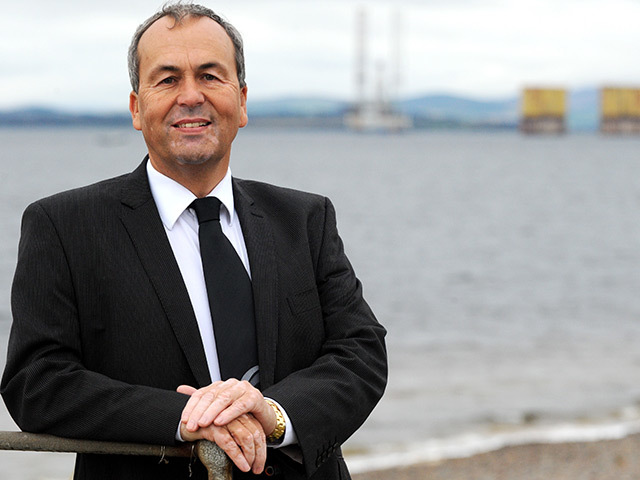
The recovery of the north-east’s oil and gas industry has not been “spectacular” despite a flurry of M&A activity in the first six months of the year, an industry expert has said.
Simmons Energy boss Mike Beveridge said his firm had successfully closed 10 deals in 2019 to the value of around $250 million and had a “really strong” pipeline due to conclude in the next year and a half.
However he said the sector was still “muted” and warned more mergers and consolidation needed to take place in order to boost the economy.
“The North Sea market is recovering solidly but not spectacularly,” he said.
“I have been saying to a few people that the overarching message this year hasn’t quite worked out as well as some people might have hoped. We all started 2019 with optimism. Everyone I have spoken to, almost without exception, says we’re not gong to hit our 2019 plan.
“Things are not as positive as we hoped they would be.”
The managing director at Simmons Energy, a division of Piper Jaffray, said he believed the recovery had been muted because oil and gas firms have been “very disciplined” and there is “too much capacity in the supply chain”.
He said: “Operators are being very measured about the speed that they sanction new projects, they are completely focused on cost control, they are driving really hard bargains with the supply chain where there is still too much capacity.
“If you think about the very obvious areas of rigs and vessels it doesn’t take too much surplus capacity to destroy those markets so there inevitably has to be some more mergers.
“There has to be more consolidation and we also have to recognise it’s a smaller industry than it is geared up to be. There’s generally just too much capacity and the only way to take that capacity out is consolidation.”
Mr Beveridge said a large portion of the current M&A market is attributed to firms selling up parts of the business they believe to be “non-core” to private equity firms who are looking for a good deal.
He said: “We are starting to see private equity come back into the space because they’re attracted by the market dynamics. It’s a decent time to buy into the oil service industry if you can acquire a decent business in a recovery stage at a decent price with a good team.”
But it would appear the industry has taken a hit to its reputation over the years with company valuations significantly down on the pre-downturn days.
Mr Beveridge added: “Investors have decided they don’t like the oilfield services sector.
“If you take Schlumberger, for example, they were valued at around $150 billion in 2014, they’re valued at around $40bn today and they’re doing well.
“It’s staggering, absolutely staggering how much equity value destruction has taken place in the last five years and is a real indication of market sentiment towards them.”
SPOOKED PRIVATE EQUITY
Some of the $250 million worth of transactions led or initiated by Simmons Energy include the sale of Benthic Geotech to Acteon, Corelab’s Promore division to Halliburton, Proserv’s Nautronix division to Imenco and Enhanced Drilling in Norway to Energy Ventures.
The firm also worked on several buy side transactions, most notably Sonardyne’s acquisition to EIVA in Denmark.
Mr Beveridge said: “The oilfield services public markets have been decimated. Share prices are down and, while the E&P companies are back to making money, they are very focused on cost control, capital discipline and shareholder returns which continues to suppress profitability in the supply chain so there is therefore less appetite for deals and fewer buyers than ever before.”
“The specialist private equity investors have been put off by poor returns and a desire to diversify their portfolios away from oilfield services.
“The more generalist private equity investors, who were lured into the sector before 2014, have been spooked by the downturn.
“With less money available and multiples declining, it’s a buyers’ market in which sellers need to modify their expectations in much the same way as the housing market has had to do.”
POLARISED MARKETS
Despite the boost to business in Simmons Energy’s Aberdeen office, the same can not be said about work on the other side of the Atlantic.
Mr Beveridge said the two markets were “fairly polarised”.
He said from a US oil services point of view there was a “strong sense of negativity” being led by investors on Wall Street.
He said: “Activity levels in the US have come down a bit. It’s not so much to do with politics.
“US production is still going up so it’s not like the industry has rolled over into a decline at all.
“It’s that the oil and gas companies in the States that are financing all the onshore activity have been told by their shareholders at Wall Street that they need to show a lot of capital discipline.
“That’s the key message Wall Street is giving out to American oil and gas companies – ‘you need to show us the money’.
“If you take the big picture Wall Street has funded US fracking for seven years with this open cheque book but the industry has been cash negative because they’ve poured so much capital in and what they’ve created they have not flipped into positive cash flow.
“So Wall Street is now saying you need to prove to us that you can make money and that transcends through the value of companies and their ability to spend.”
Mr Beveridge said the negativity running around the US at the moment is creating a lot of “negative sentiment”.
He added: “Here in Europe it is a business that is starting to feel pretty good from an activity level.
“There is more interest than there has been in five years in terms of international M&A, more recognition that subsea and offshore is going to be a critical contributor to the market going forward.
“Because you have really solid activity levels starting to percolate through the chain there’s a higher degree of positivity than we are seeing in the US.”
Recommended for you
